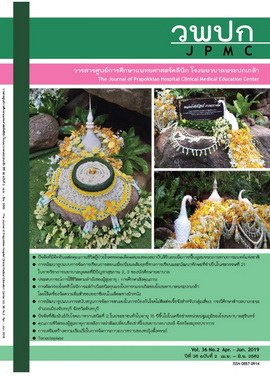Factors Affecting Quality of Life among Stroke Patients of Sirindhorn National Medical Rehabilitation Institute
Main Article Content
Abstract
Background: Stroke is a neurological disorder which is a major health problem in Thailand. Stroke survivors frequently suffer from disabilities resulting from a disease which severely impact on their quality of life. Quality of life measurement is important because it reveals the patient's own perception of their disabilities resulting from a disease. Knowledge of which factors affect quality of life can assist health personnel to develop suitable programs to enhance patients’ well-being.
Objective: The objectives of this study were to (1) determine the patient factors, caregiver factors and patient’s quality of life, and (2) determine factors affecting quality of life in stoke patients at the Sirindhorn National Medical Rehabilitation Institute (SNMRI).
Materials and method: A cross-sectional survey was conducted to investigate the relationship between patients who had suffered strokes and their quality of life. A total of 135 out of 560 stroke SNMRI patients who had normal cognitive function were selected to take part in the study between April and June 2018, using the simple random sampling method. Data were collected using a questionnaire. The reliability value for quality of life was 0.87 with depression at 0.77. Statistics used for data analyses included frequency, percentage, mean, standard deviation, and multiple linear regression.
Results: Factors that significantly affected the quality of life of stroke patients included educational level, depression scale, activities of daily living scale, caregiver type, and care time period which accounted for quality of life score at 42 %. Patients with diplomas or lower educational levels had lower quality of life than patients with bachelor degrees or higher. Patients with no or minimal depression had lower quality of life than those experiencing higher rates of depression. Patients with greater independence had higher quality of life than those who depended on others. Patients with caregivers who required extensive and lengthy care had lower quality of life than those who did not have caregivers and were more self-sufficient.
Conclusion: To develop optimal policies and program delivery for stroke patients, health personnel and all relevant health administrators should monitor symptoms of depression and promote patients’ independence in daily living activities through education and career paths. Caregiver burden should also be considered.
Article Details
References
Patel MD, McKevitt C, Lawrence E, Rudd AG, Wolfe CD.Clinical determinants of long-term quality of life after stroke. Age Ageing 2007;36:316-22.
Bureau of Non Communicable Diseases.Annual Report 2016. Nonthaburi: Thai NCD Department of Disease Control; 2016.
Permsirivanich W,Suwapan D. Update on Poststroke Management. Songkhla: Chanmaung Kanpim; 2008.
Jönsson AC, Lindgren I, Hallström B, Norrving B, Lindgrean A. Determinants of quality of life in stroke survivors and their informal caregivers. Stroke 2005;36:803-8.
Carod-Artal FJ, Egido JA. Quality of life after stroke: the importance of a good recovery.CerebrovascDis 2009;27:204-14.
Kranciukaite D, Rastenyte D.Measurement of quality of life in stroke patients. Medicina(Kaunas) 2006;42:709-16.
Khanittha Raksaken, Surachat Sittipakorn, Apinya Wongpiriyayothar.Quality of life of stroke survivors after the first six month, Mahasarakham hospital.Journal of Science and Technology Mahasarakham University. 2013:164-71.
Chuejedton R, Tamdee D. Factors related to quality of life among stroke survivors. Journal of Associated Medical Sciences 2017;50:597-604.
Klinedinst NJ, Gebhardt MC, Aycock DM, Nichols-Larsen DS, Uswatte G, Wolf SL, et al. Caregiver characteristics predict stroke survivor quality of life at 4 months and 1 year. Res Nurs Health 2009;32 :592-605.
Nichols-Larsen DS, Clark PC, Zeringue A, Greenspan A, Blanton S. Factors influencing stroke survivors's quality of life during subacute recovery.Stroke 2005;36:1480-4.
Department of Mental Health. Guideline for Mental Health Evaluation for personels. Nonthaburi: Division of Mental Health Promotion and Development; 2015.
Dajpratham P, Meenaphant R, Junthon P, Jantharakasamjit S, Yuwan A.The Inter-rater reliability of barthel index (Thai version) in stroke patients. J Thai Rehabil.2006;16:1-9.
Mahatnirankul S, Tantipiwattanaskul W, Pumpaisanchai W, Wongsuwan K, Pornmanajirangul R. Comparison of the WHOQOL-100 and the WHOQOL-BREF (26 items). Chiangmai: Suanprung Hospital, Department of Mental Health; 1998
Kamel A, Ghani A, Zaiton MA, EI-Motayamm AS, EI-Fattah DA. Health related quality of life in stroke survivors measured by the stroke impact scale. Egypt J Neurol Psychiatr Neurosurg2010;347:267-74.
Robinson-Smith G, Johnston MV, Allen J. Self-care self-efficacy, quality of life, and depression after stroke. Arch Phys Med Rehabil2000;81:460-4.
Kunyodying T, Pothiban L, Khampolsiri T. Dependency of the elderly with stroke, caregiver burden, social support, and quality of life among older caregivers. Nursing Journal2015;42:107-17.

